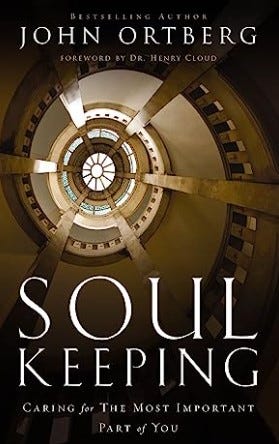A Philosopher's One-Sentence Advice for Living a Healthy Spiritual Life
If eliminating hurry from our lives is the key to healthy spiritual living, I fear for the spiritual health of humans.
“You must ruthlessly eliminate hurry from your life.”
This was the advice philosopher Dallas Willard gave to John Ortberg, a Christian author who asked Willard the key to living a healthy spiritual life.
I first heard Willard’s advice in church, where my pastor shared his words and an anecdote about Willard. I had not thought about Willard’s advice a whole lot since until I received Ortberg’s book, Soul Keeping: Caring for the Most Important Part of You.
Ortberg became friends with Willard not long before the longtime USC professor died in 2013. His book, as the title implies, focuses on a neglected part of humans: the soul. I say “part” of humans, but that’s probably a poor word to describe the soul.
“You do not have a soul,” C.S. Lewis once supposedly observed. “You are a soul. You have a body.”
It’s unclear if Lewis actually said this, but Ortberg would agree with this, I think, and so do I.
A lot of people today don’t believe in the soul, but it’s worth pointing out it’s hardly an idea unique to Christians. Plato believed in the soul and so did Confucious. The soul is a feature of Islam and Judaism. This summer, while speaking to a prominent Randian, I learned that even Objectivists believe in the soul. (I do wonder if their conception of the soul is different than mine, but that’s for a future conversation.)
Ortberg is a powerful writer and, perhaps more importantly, an honest one. He’s refreshingly candid about his own human struggles, foibles, and idiosyncrasies. This, combined with his ability to channel story and anecdotes effectively, makes for good reading on an important topic.
Which brings me back to Willard’s advice.
If eliminating hurry from our lives is the key to healthy spiritual living, I fear for the spiritual health of humans. Most of us live our lives in constant hurry, plugged into a matrix of virtually non-stop digital stimulation. The smartphones. The tweets. The tiktoks. The texts and instant messages. The Facebook scrolling.
I wish I could say I’m an exception to this; alas, I am not.
Like many people, I sometimes feel restless without my phone. Turning it off and watching a movie with the family feels like an escape—and then I realize it’s still screen time. Books are a refuge, but I noticed recently it takes me longer to slip into a book, as if my mind doesn’t want to let go of the stimulation.
It’s not just the fault of digital gadgets, of course. But I think digital technology is a big part of it, especially when you factor in that many humans today haven’t been taught or learned self-discipline.
Workaholism is another problem. I attended a conference a couple years ago where a speaker said he realized he had a problem when he was taking calls while his wife was giving birth to their first child. He decided then he had to make a change.
You could create an entire list of other things that create hurry in our lives and disrupts our souls.
Some people may not see anything profound in Willard’s advice, and that’s ok. Some people don’t believe in a soul, and that’s ok too.
But his words stuck with me. I want to keep a healthy soul. So I plan on taking some steps to create more order in my daily life, and a little less hurry in 2025.






Ha. That's nice of you to say. I'm at my most productive when I don't feel hurried. My advice: just find ways to keep yourself productive-- whether it's pickle ball, gardening, reading the Bible, reviewing books, or all the above. This is much more difficult than it sounds.
I love that you have brought this emphasis forth, mister Miltmore. I do consciously think about not being in a hurry, and when I find myself hurrying I immediately notice, and with the noticing I am immediately aware of everything that I either have done or have not done that led to my being in a hurry. It is indeed a spiritual practice in and of itself. One of my brothers once said of me, “He’s always heading out the door at the last minute but he never seems to be in a hurry”. Countless numbers of times I have been implored by others to hurry and, where it used to be that it would sometimes agitate me, I have long found it not unsettling. Be well, thank you.